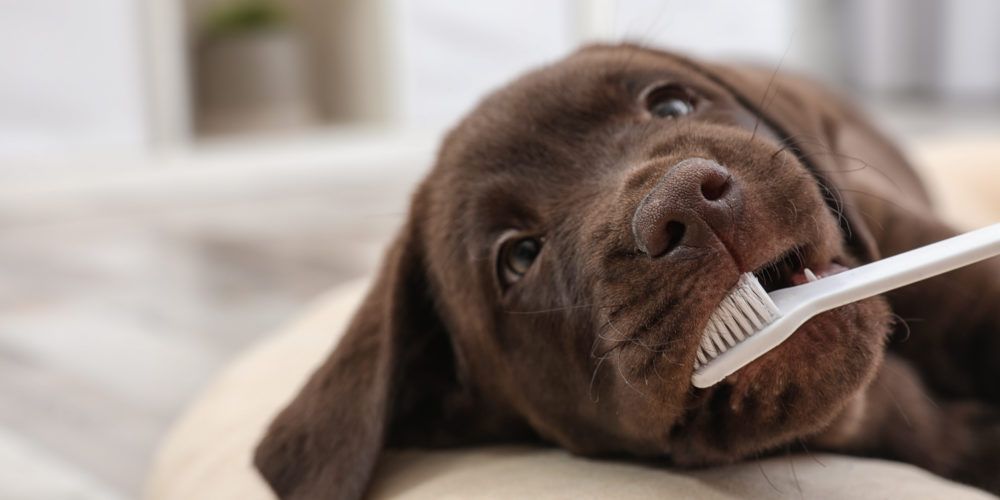How to keep your pets’ teeth clean and healthy?
According to RVC – One in every 8 dogs (12.5%) overall suffers from dental disease every year. (https://www.rvc.ac.uk/vetcompass/news/new-rvc-research-gets-to-the-root-of-dental-disease-in-dogs)
Cleaning your pet’s teeth daily is just as important as you cleaning your teeth. Here are some helpful tips on how to keep your pets’ teeth clean and healthy.
Teeth Brushing
You may not know but your four-legged friend’s teeth should ideally be brushed daily to remove the build-up of plaque and prevent them from having dental problems like gum disease and rotting teeth.
To brush your pet’s teeth, you will need a pet toothbrush and pet toothpaste. Normal-sized toothbrushes may be too big for your cats’ or small dogs’ mouths. You can also get finger toothbrushes for pets; these are perfect for cleaning their teeth and are available at your local vets.
Do not use human toothpaste, this contains fluoride and if eaten by your pet, they can become very poorly.
Before you start cleaning your pet’s teeth, consult with your local vet, as they can show you the best way to clean your pet’s teeth.
Start cleaning your pets’ teeth when they are young so they can get used to it and it becomes a routine. You might have to train your pet to become confident about having their teeth cleaned. You can do this by touching the face and mouth of your pet before you start the cleaning process.
Unlike dogs and cats, rabbits’ teeth don’t need to be cleaned. If they have the correct, healthy diet their teeth will naturally start clean.
If you are worried or have any concerns about cleaning your pets’ teeth, please contact your local Willows Veterinary Surgery.
Dental Chews
Dental chews are designed to help remove the build-up of plaque and tartar on your pets’ teeth to keep them healthy. The chews are an alternative if brushing your pets’ teeth is not possible. Chews are just an additional tool; they should not be a substitute for regular brushing or professional cleaning.
Dental chews can be quite high in calories and contribute to weight issues, so ensure you are mindful of how often you are giving them to your pet.
Dental chew toys are also available for dogs and cats, these are a healthy alternative to dental chews.
A Healthy Diet
A healthy, balanced diet is a very important factor in your pet’s dental health. If they have a poor diet, their teeth and gums could suffer. Some commercially produced dog and cat food can have a high sugar content, if this sugar isn’t cleaned off their teeth it could cause their teeth to rot, just like in humans.
Special dental diets for your dog and cat are available, please discuss these with your local Willows vet.
As rabbits don’t need to have their teeth cleaned, a healthy diet is so important for their dental health. Rabbits teeth grow on average 2-3mm a week, it is vital they have a diet high in fibrous foods, this will help keep their teeth at an optimal length.
Being Observant
Just like in humans, if your pets’ teeth aren’t cleaned daily, plaque will start to build up and cause them to suffer from poor dental health. Here are some signs to look out for if your pet’s dental health needs looking at:
- Bad Breath
- Pain when eating – your dog might eat on one side of their mouth.
- Excessive drooling
- Plaque and tartar build-up (yellow or brown teeth).
- Inflamed or bleeding gums.
- Broken, missing or wobbly teeth.
- Swelling of the face
- Rubbing or pawing at their face
- Losing weight or preferring soft food to hard food like biscuits.
- Grooming less – this is due to their month hurting.
- Grinding teeth (Rabbit)
If your pet is experiencing any of these symptoms, please contact your local Willows vet.
Regular Check ups
It is very important to have regular dental check-ups with your vet, this will allow them to keep an eye on your pet’s dental health and spot any problems early on, so they don’t develop into a more serious issue.
Your vet should check your pets’ teeth when they go for their annual check-ups. These check-ups will also allow your pet to become comfortable with vets examining their teeth and mouth, and will give you the opportunity to ask any questions you might need answering regarding your pet’s dental health.
If dental hygiene is becoming an issue, they will recommend that your pet has a scale and polish to remove the build-up of plaque. If this is left untreated it leads to tartar, gingivitis, and finally tooth decay which can be painful for your pet and costly to treat.


